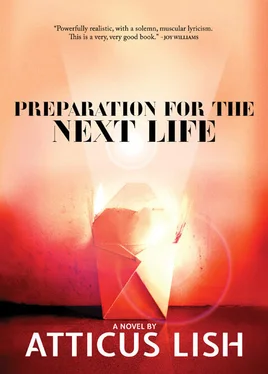They were not hiring, but try the paper.
On East Broadway, there was a condemned building where you could stay for ten dollars if you called the number. When she pushed the buttons on the intercom, she heard nothing. She looked past the notice that had been partly scraped off the glass and waited for anything to happen. She bounced on her toes, her face ruddy, hitting her arms and thighs through the denim. A bus pulled away behind her and revealed a sign for New York to Virginia across the street. She stared at it and thought about it.
In a basement, where she had gone to get warm, she heard a hollow clattering and down a hallway that smelled like beer found an underground mountain of aluminum and crushed glass where they were buying bottles and cans from the people who found them on the street.
She read the handwritten notices taped to the traffic lights, the ones with the bottom edge cut in fringes with a phone number written over and over, so you could tear one off.
In the dusk, she saw an open flame burning on the sidewalk and old women in quilted jackets feeding spirit money into it with tongs.
Her second day out of jail, she looked for work as far as the Imperial Dragon Kitchen in South Jamaica — the wide empty avenue with the clothes strewn in the street, pigeons on the stop lights, early on a Friday morning. The long wait, freezing — hugging herself, hitting her legs, blowing on her hands.
Three males in ragtops looked her over.
The street smelled like hair oil and dryer sheets. The pigeons were seagulls, she realized. The front page of the Sing Tao was a blue square. It looked like the sky of western China, the same color as the sign over a Uighur restaurant with the pastureland rolling and a steer superimposed in the foreground and flaking gold Islamic script. It looked like the sky today in New York.
She watched them taking the locks off and pulling the shutter up before she crossed out of the winter sun and leaned her head in. There was a rat in the center of the floor.
Not open yet. The speaker had black plastic shoes and acne.
What about the job?
What job?
The job in the paper.
Two other women pushed inside, complaining about the cold, carrying their lunches in plastic bags, and went behind the counter with the money cat on it.
It says apply in person.
He read it while picking his nose. There was a long hair growing out of a wart on his chin. He took his long nail out of his nose, looked at what was on it, flicked it, it clung, put his nail on the classified ad, tapped it. This, he said. The number. You call this number.
She called it and voicemail picked up and all she got was music, and so she started walking in the pale winter sun, not stopping when she came to the subway. Instead she picked up her pace, strode beneath the tracks, crossed a road with a median, and walked along the median, looking out at the wide open space and started hiking north by the sun. She went past all the places where you could buy a coffee and a roll and kept going until there were no businesses, no people, simply buildings and the sky. She walked rapidly, her plastic bag swinging in her fist with her clothes in it. A bus drove by her and she let it go. She carried on into the afternoon, migrating along the backdrop of the buildings with parapets connected together like one great fortress wall. The graffiti repeated for miles. Stigz. Luni. Blip. Crew. Tire and wheel. Audiotronic. A dog got up and shadowed her on the other side of a fence until it reached the limit of its enclosure while she kept going.
Her shadow changed, the graffiti changed. She crossed Metropolitan Avenue and a thundering underpass. When she had found her way onto another northbound road, a plane flew overhead like the hawk leading the drum girl out of the desert. The sun snuck behind her other shoulder, it only fell on half the street. She sensed woods beyond the houses. In the windows, there were flowers, broken blinds, a Puerto Rican flag, a stone statue of a saint in a glass case in someone’s yard. On a garage, there was a poster for Tito Swing a la Semana.
At 110 thStreet someone said Chinita and blew kisses. It was evening and there was music.
She went into a pizza place, a handwritten sign on the door saying baño sólo para clientes. One of the short barrel-chested men behind the counter with their hats on sideways, thumping out the dough, asked if she was frío.
Tire, she said. I very tire.
She leaned her elbows on the glass and looked down at his hands dusting out the flour on the dough.
Por qué?
You know Jamaica? I walk from this one, very far.
No, he said, too far. She hadn’t done that.
I come very far.
Really? he asked in Spanish.
Yes. I don’t lie.
Maybe, he allowed.
Before, I in jail.
This he believed from the way she looked, a short woman in jeans, hatless, with the plastic bag in her fist.
They let her use the bathroom. Okay, mamacita, they said. She ran hot water in the sink and washed her hands with the coconut soap, used the paper towels. Closed her eyes. There were plastic flowers. It was a nice small room. The pizza baking out there, in the narrow store, the ovens.
On the phone, a man told her where to come in Queens. He called it Queensie. He picked her up at a gas station on Roosevelt Avenue in view of the projects, the train yard, and the stadiums and derricks across a river. They accelerated down a boulevard that roughly followed the water. She was warm in his minivan. She hadn’t slept and had a headache. She watched building supply warehouses going by outside her window, thinking she could fall asleep.
He turned into a back street and she sat up. He was a fat solid man in an expensive parka, his stomach touching the steering wheel, turning and accelerating, taking them zipping past graffiti-covered walls and courtyards. Slowing at a construction site, he said, Building. She reached for her bag, but he put out his large soft hand to stop her, not quite touching her. No. Not yet. He slowed again. Building. Everything new. There were weathered boards and scaffolding. Maybe I buy. Maybe the investment property. He insisted on speaking English with her in a soft delicate voice that back home would be called sweet, causing her to wonder if he was from Taiwan.
They parked in an alley near the expressway surrounded by faded brick walls. She climbed out of his car and stood in the cold with her arms crossed, the wind blowing strands of her unwashed hair across her drawn face, waiting with her bag over her shoulder while he went through his keys. She saw people’s laundry hanging outside their windows. He got the paint-peeling door open and led her in, up a stair, close quarters, stale cigarettes, concrete-colored light filtering in from an angle. Nobody home, he said. She heard the dead silence of two-by-fours and wall board, his breathing after climbing the stairs. They were alone and she hung back, letting him go ahead. On the second floor, they picked their way among shower shoes and plastic sandals. It was a standard illegal apartment divided into sheds to accommodate eight or more people. The first kennel was made out of a shoe rack and plywood and see-through plastic film. The jury-rigged door was held shut with a bike chain. Through the plastic, she saw somebody’s mattress. She put her eye to the film and looked: a can of Kirin Afternoon Tea.
The kitchenette was an alcove. In his parka, he filled the space entirely, turning in place, looking at things so that she would look at them too — the cupboard hanging open, the frozen explosion of clutter. No walls visible, just cardboard boxes, garbage bags stuffed with clothes, luggage. Mushrooms floating in a wok.
Refrigerator, he said. He tried to open it and bumped his leg. Sink, he said. Everything very complete. He turned on the tap and put his large fingers in the water, rubbing them together like a man feeling silk. He looked at her. Lifted his fingers to his face and tasted the water, brushed the water off his brown lips, leaned in and drank from the tap, came up with his cheeks full, spit in the sink, brushed the water from his lips, twiddled his large fingers to shake the water off.
Читать дальше












